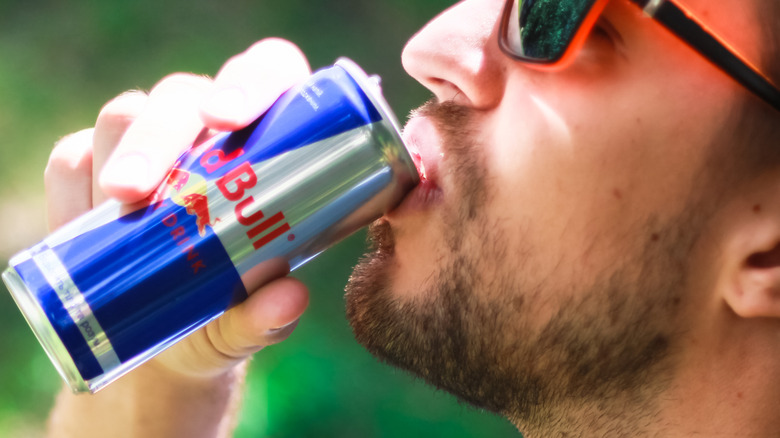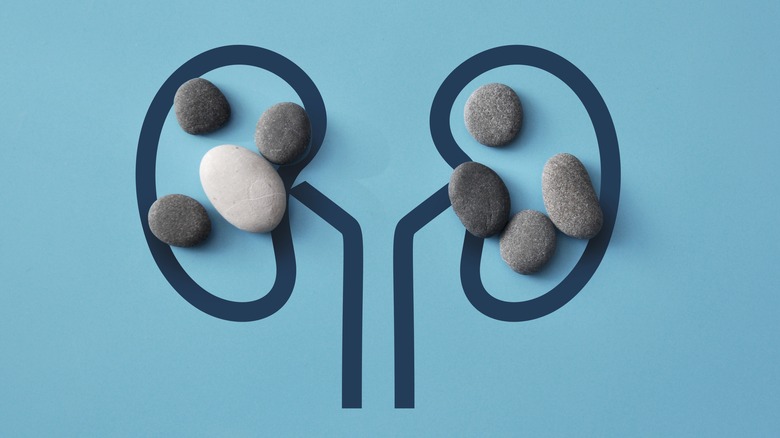How Bad Is Red Bull For Your Health?
You might be surprised to learn that energy drinks have been trending. With Bang, Monster, Red Bull, Four Loco, and C4 on the market, the options are plentiful. You can find over 2 million Instagram posts with #energydrink in the caption as of this writing. This number is alarming considering the many safety concerns surrounding energy drinks, as per the National Center for Complementary and Integrative Health.
Most energy drinks, according to EatingWell, include ingredients such as ginseng, B vitamins, taurine, and the heavy hitter, caffeine. These drinks also offer a variety of flavors. Red Bull is no stranger to targeting the taste buds, as there is an assortment of flavors to choose from, including coconut, watermelon, and kiwi apple.
However, Red Bull was not the first energy drink on the market. The New York Times Magazine reported that in 1962, Japan introduced the first energy drink called Lipovitan D. Today, Red Bull is certainly one of the most popular choices, controlling nearly 25% of the energy drink market (via Statista). Healthline reports that the drink might give you an energy boost, at least for a short period of time, but it may come at a price.
Red Bull can increase risk of heart attack or stroke
Red Bull can increase your risk of a heart attack or stroke, even if you're young. Researchers in Australia found that 30 young adults showed symptoms of cardiovascular disease after drinking a single can of Red Bull (per Reuters). Therefore, you might want to avoid Red Bull if you already have heart issues.
According to Cleveland Clinic, energy drinks can put you at risk for reversible cerebral vasoconstriction syndrome. This constriction of blood vessels in the brain can cause severe headaches and can trigger a stroke.
One can of Red Bull might give you the energy you need, but if you're under stress, it might be more harmful. A 2014 study in the American Journal of Cardiology subjected 20 young and healthy participants to a challenging mental task. Before the task, one group drank water, and the other drank Red Bull. Those in the Red Bull group had higher blood pressure and heart rate and lower amounts of blood to the brain. The researchers suggested that if you use Red Bull to improve your brain power, it might be counterproductive.
Energy drinks can add unwanted pounds
Eating too much sugar has a direct relationship with your weight. According to WebMD, when research participants decreased their sugar intake, they lost some weight. However, when sugar consumption increased, so did the weight.
The Red Bull website lists a single 8.4-ounce can of Red Bull as having 27 grams of added sugar. That might not sound like a lot. However, the American Heart Association suggests no more than 36 grams of added sugar for men and 25 for women per day. Drinking one can put you over or close to your daily recommended limit.
Although a single Red Bull won't cause you to gain weight, making it a daily habit will add to your waistline. A 2018 preclinical study in the Anatolian Journal of Cardiology found that the unique ingredients found in energy drinks such as Red Bull contributed to significant weight gain in lab rats. On top of that, the high sugar content in energy drinks can spike blood sugar, which leads to storing body fat (via GQ).
Energy drinks can disappoint your dentist
The sugar and acid in Red Bull also battle the enamel on your teeth. When the ordinary bacteria in your mouth feed on the sugar in energy drinks, a high amount of acid builds in your mouth. This weakens your tooth enamel, which can eventually cause cavities (via Dental Choice).
A 2021 study in the Scientific World Journal surveyed more than 2,000 students aged 12 to 15 in Saudi Arabia. The more often the students reported drinking sugar-laden beverages like Red Bull, the more likely they had dental problems such as cavities or tooth decay. The researchers noted that the habit of drinking sugary drinks each day contributed more to tooth decay than simply consuming a lot of sugar in a single sitting.
Although the sugar in energy drinks is often blamed for dental problems, the acids in them can also contribute to significant tooth erosion, according to Dental Choice.
Your sleep can be disrupted by energy drinks
Because energy drinks have between 70-100 milligrams of caffeine, they can block the sleep-inducing chemicals in the brain (via Sleep Foundation). Caffeine also disrupts our circadian rhythm, which tells us when it's bedtime. If it's consumed within four to six hours before going to bed, it can disrupt your sleep.
We might think that a Red Bull or two might help us concentrate during the day or keep us awake during that long drive. However, this could be a signal that we're not getting enough sleep. Because we're using energy drinks to combat fatigue, this cycle can affect our mental health. According to a 2011 study in the College Student Journal, consumption of energy drinks and sleep problems both contributed significantly to levels of anxiety in college students.
This doesn't mean that drinking Red Bull causes anxiety. Instead, the research shows that energy drink consumption, sleep problems, and mental health relate to one another.
The taurine in Red Bull can stress the kidneys
Red Bull contains taurine, which has some benefits for the body. According to a 2019 study in the Canadian Journal of Physiology and Pharmacology, taurine is a nonessential amino acid that the heart and brain produce in small amounts but are not enough for our daily needs. Thus, it may make sense to supplement our diet with taurine which could benefit our cardiovascular system. If you're engaging in high-intensity exercise, taurine might help reduce muscle aches when combined with other amino acids (per MedicineNet). It's wise to always speak to your healthcare provider before adding supplements to your diet.
But if you're getting your taurine from energy drinks, beware. Consuming too many can cause problems. The excess taurine in Red Bull can tax your kidneys, which could result in renal failure, according to VeryWell Health. A 2020 case study in the Journal of Medical Case Reports asserted that a 62-year-old woman's five-can daily energy drink habit contributed to her kidney injury.
Mixing Red Bull with alcohol can be even more toxic. Although this 2018 study in Toxicology & Applied Pharmacology was conducted on rats, it found the cocktail of alcohol, taurine, and caffeine caused significant kidney issues.






